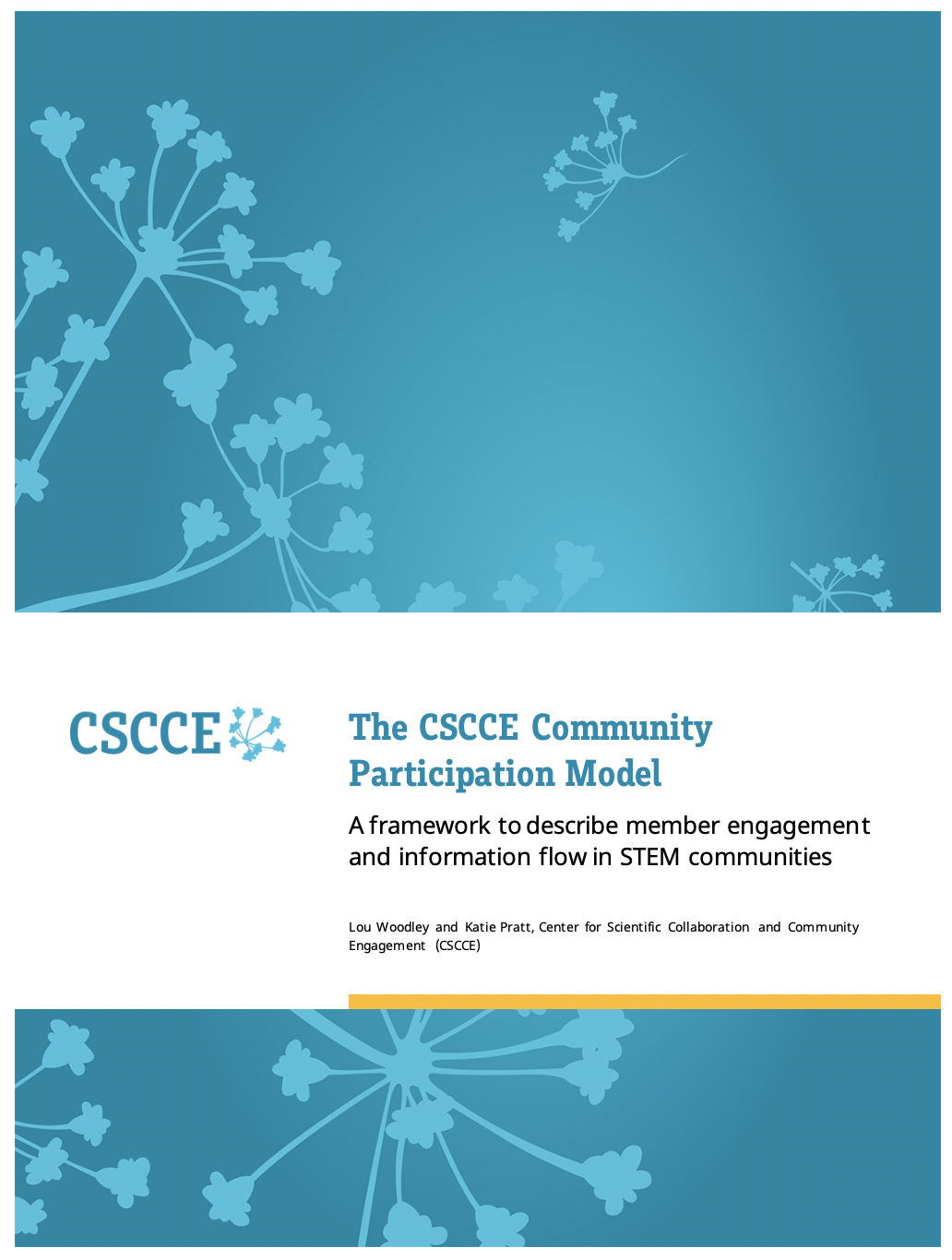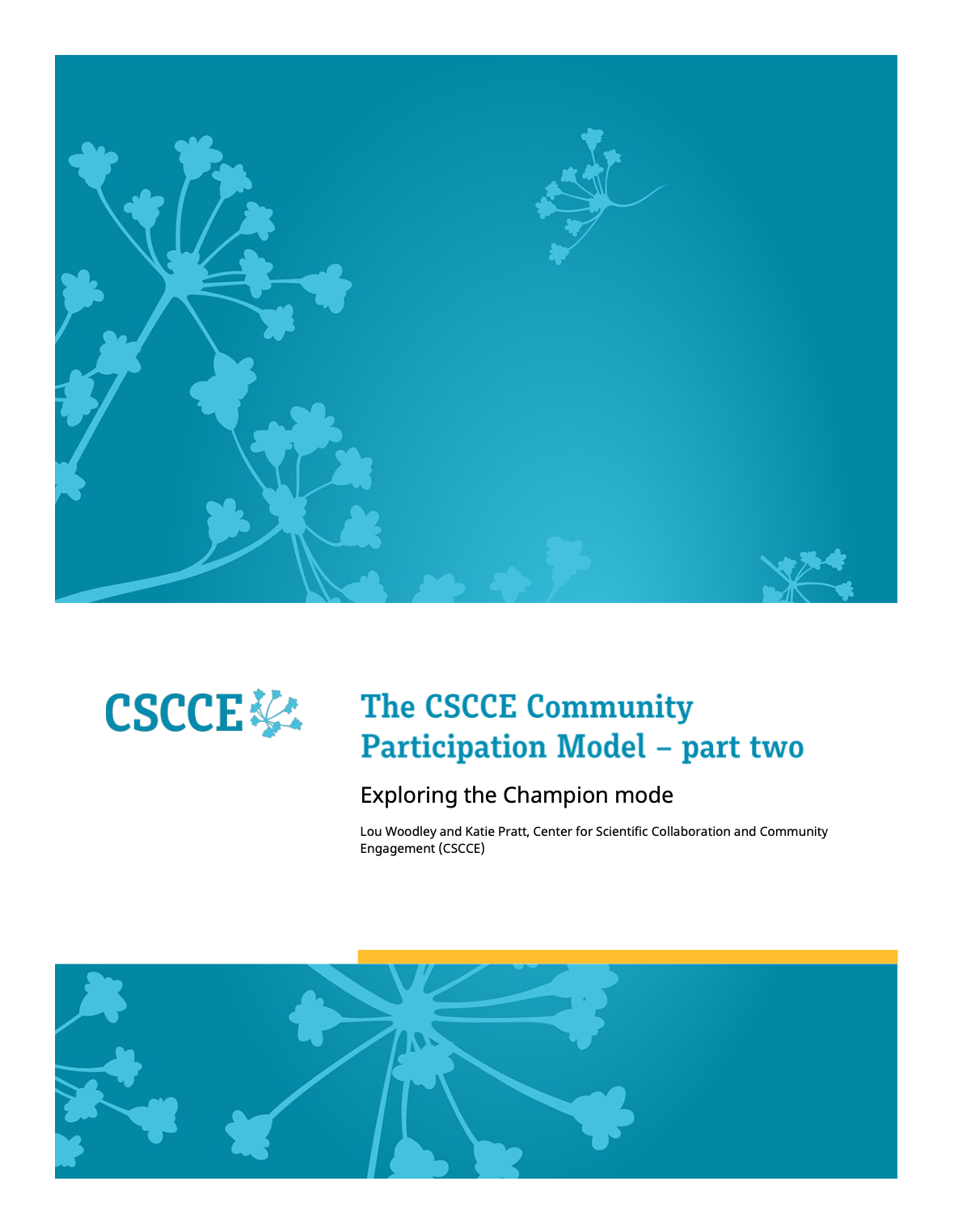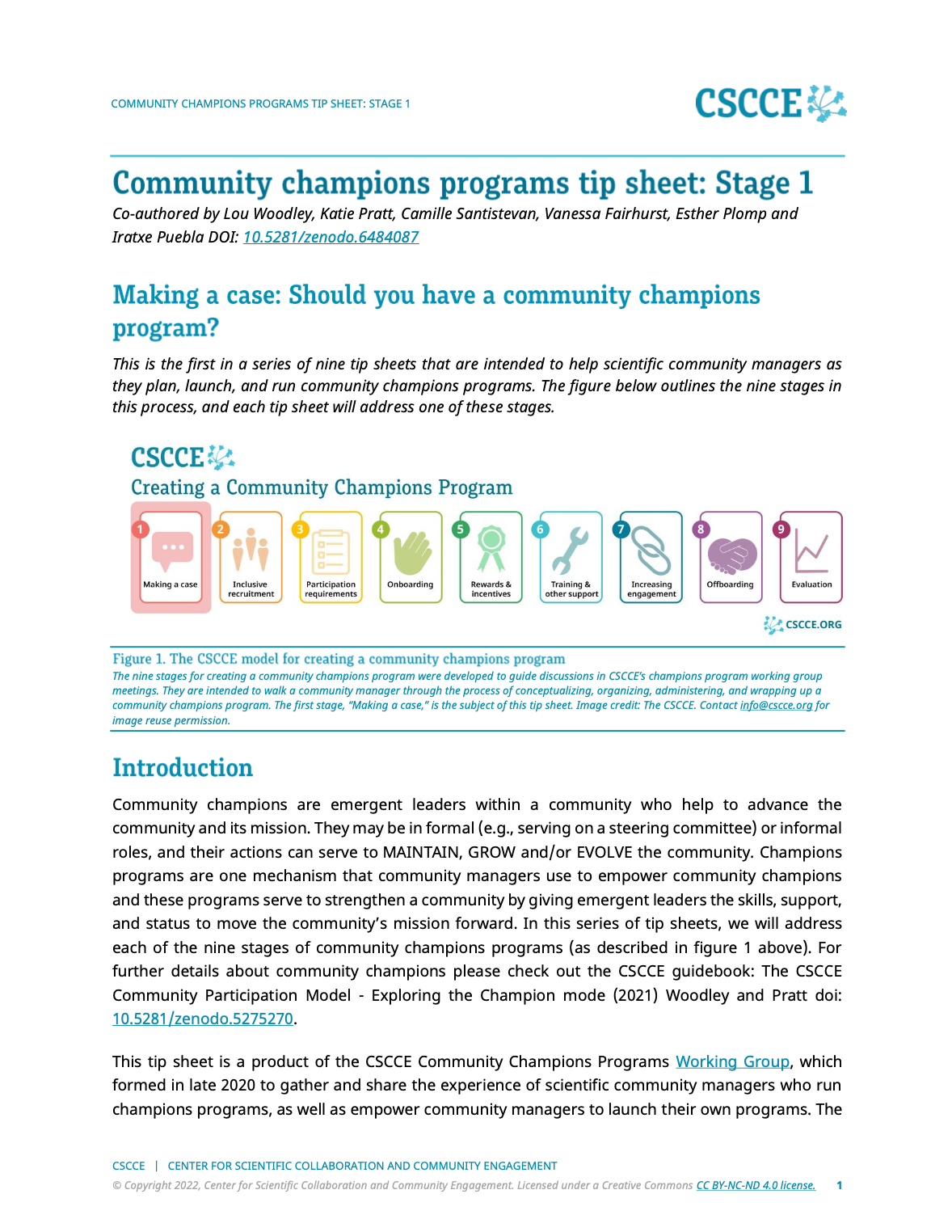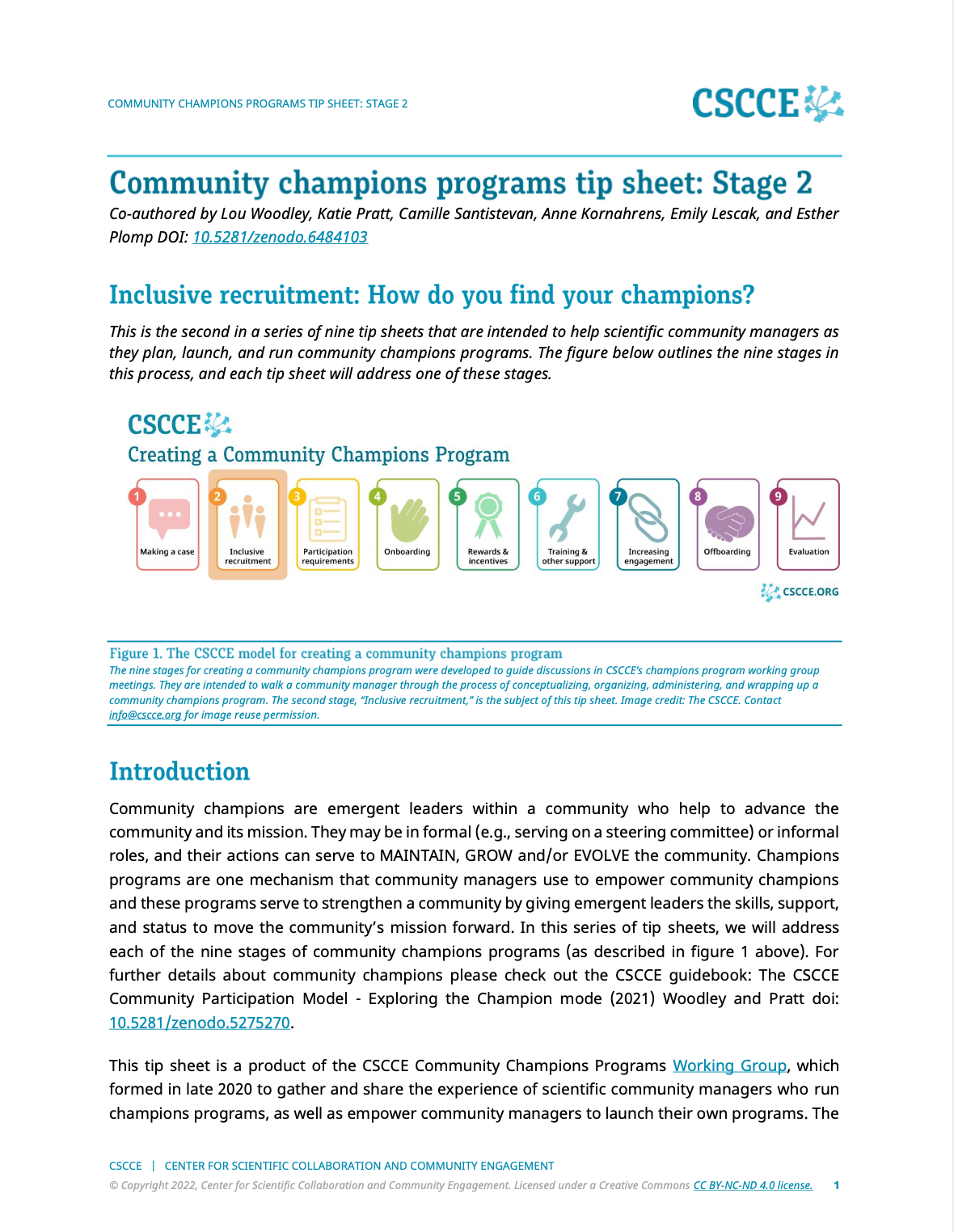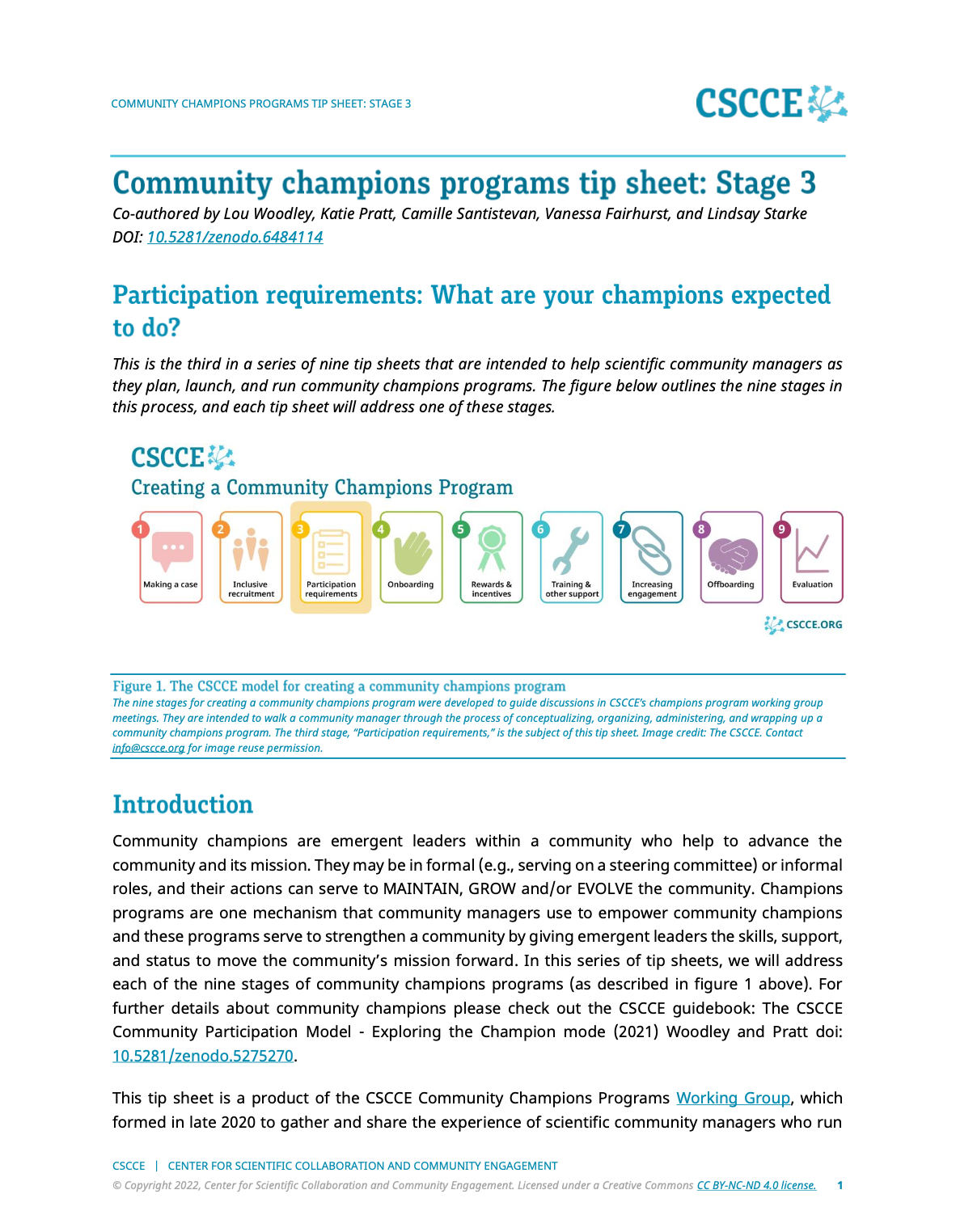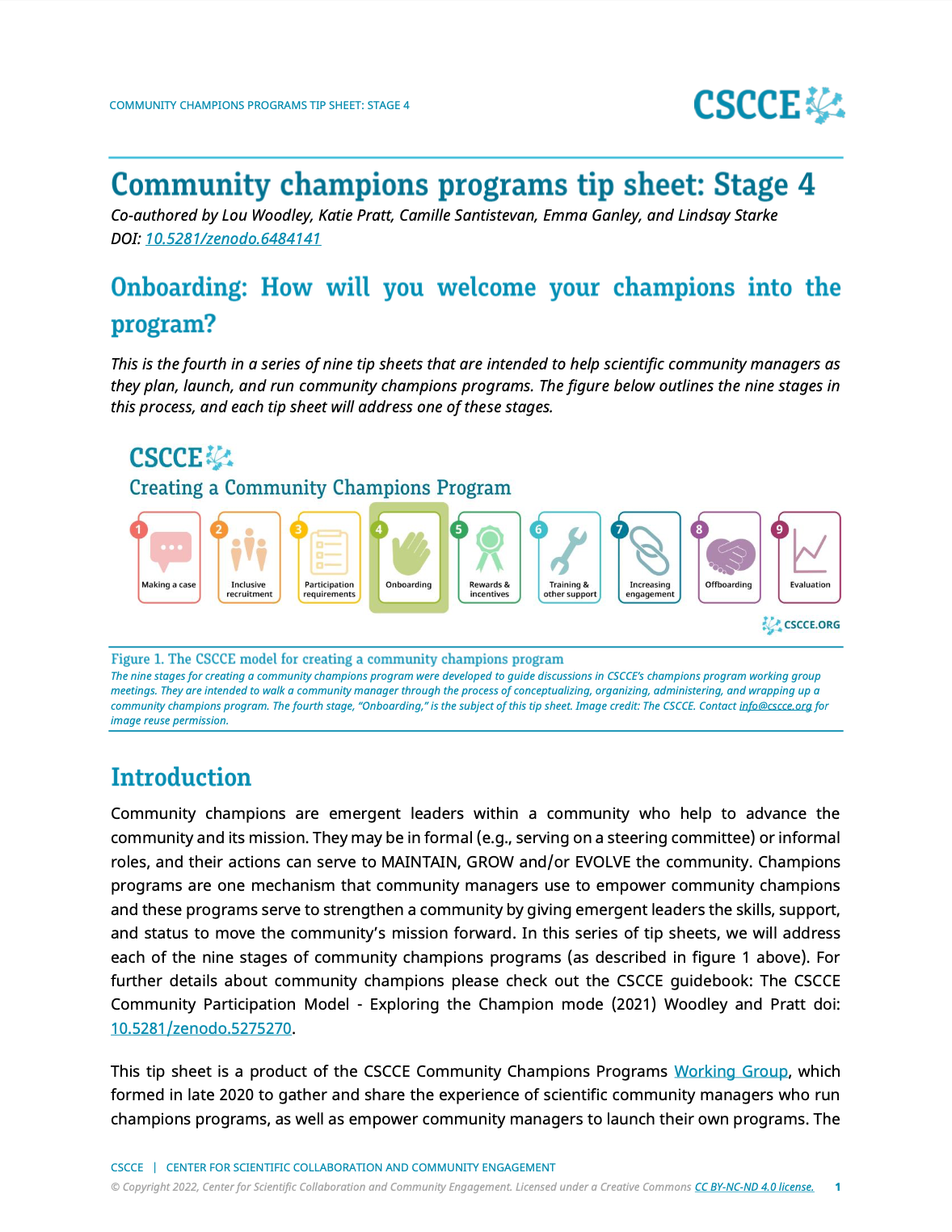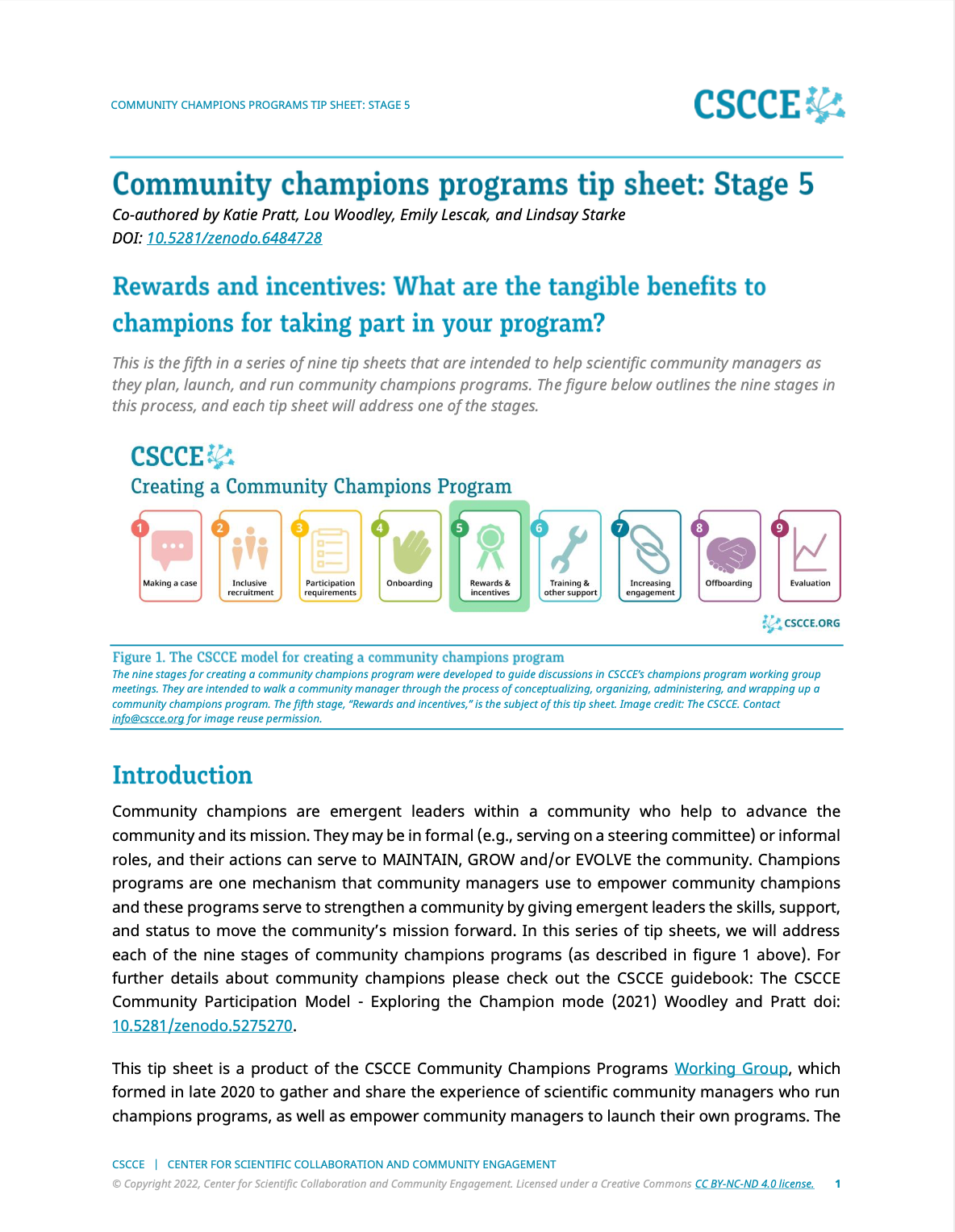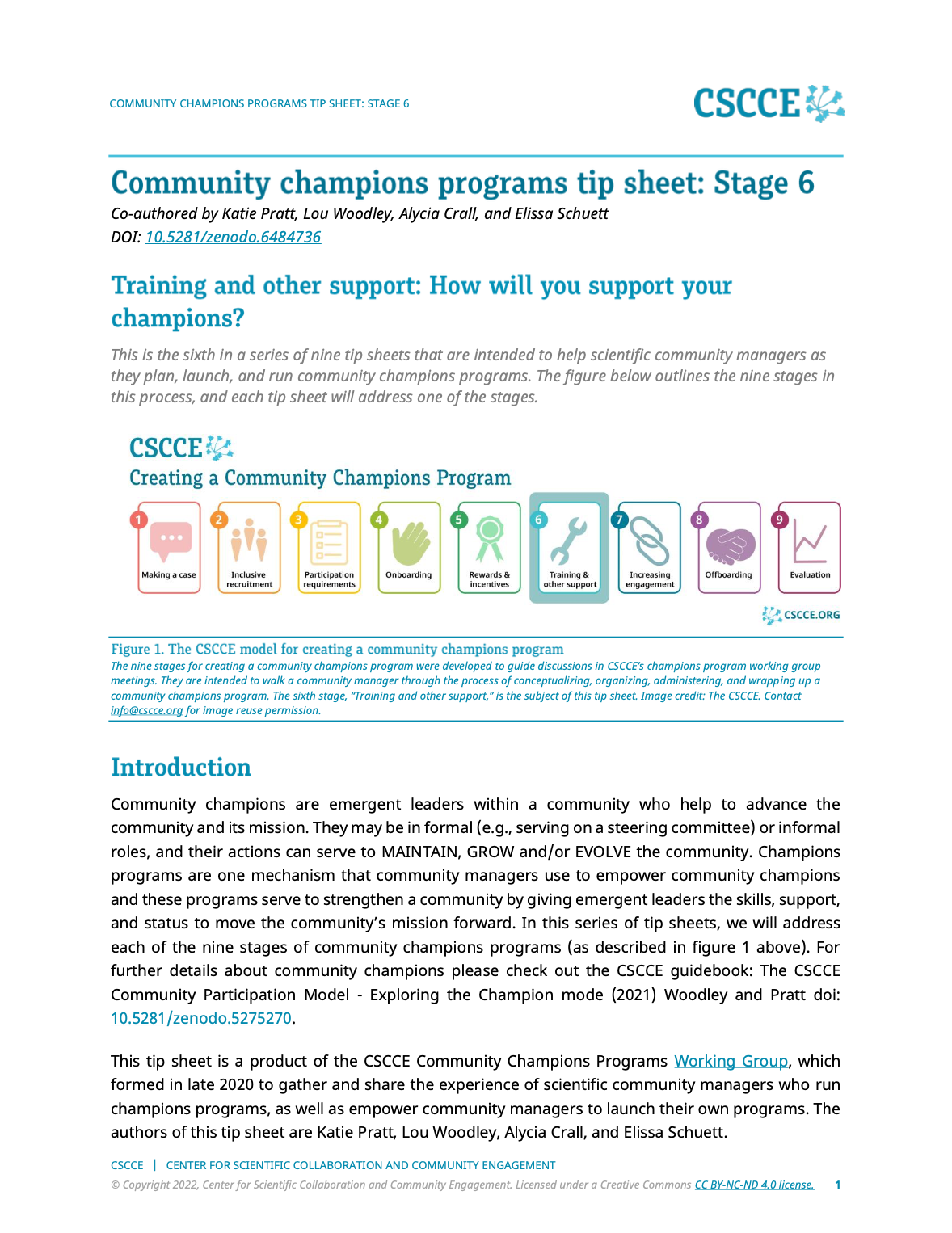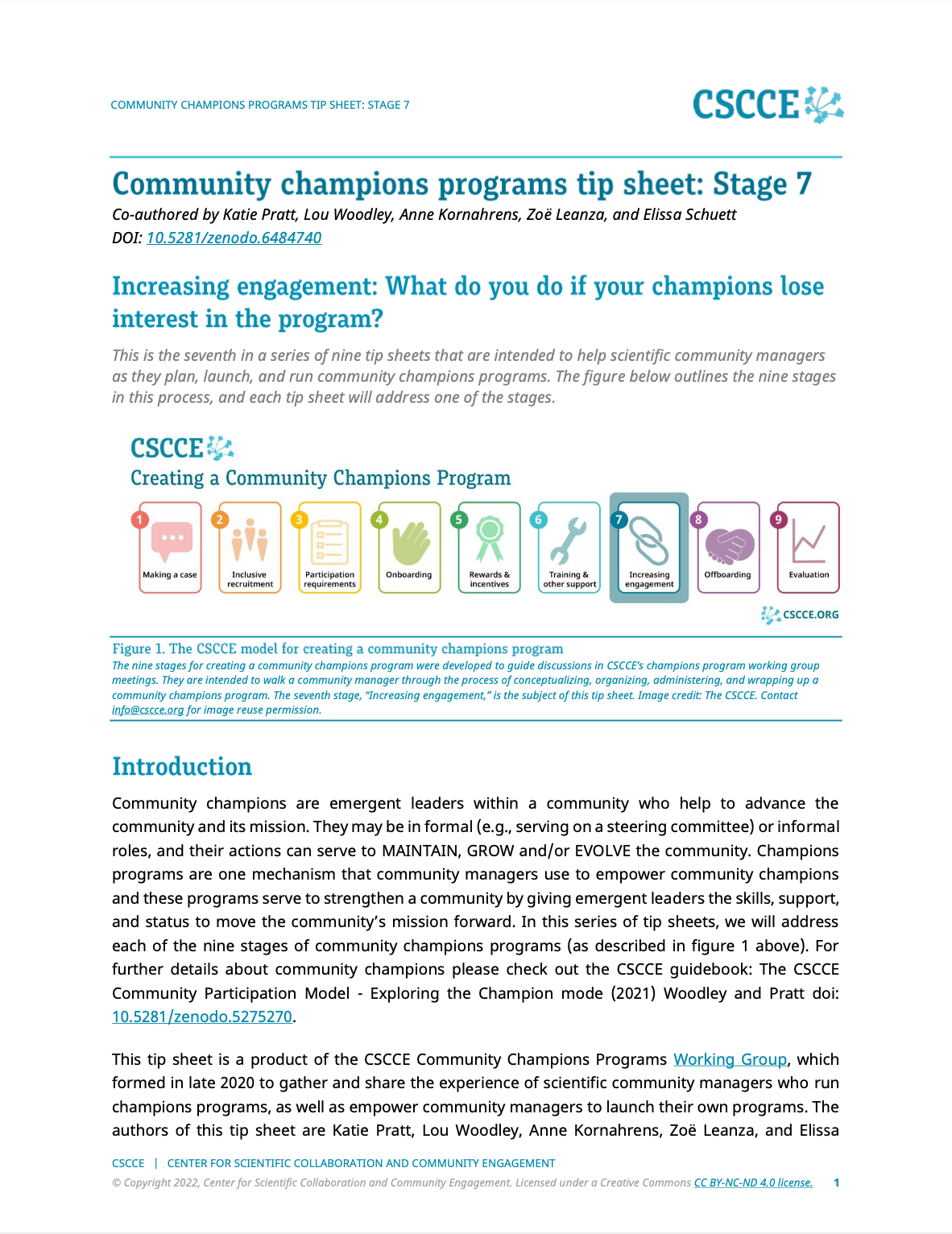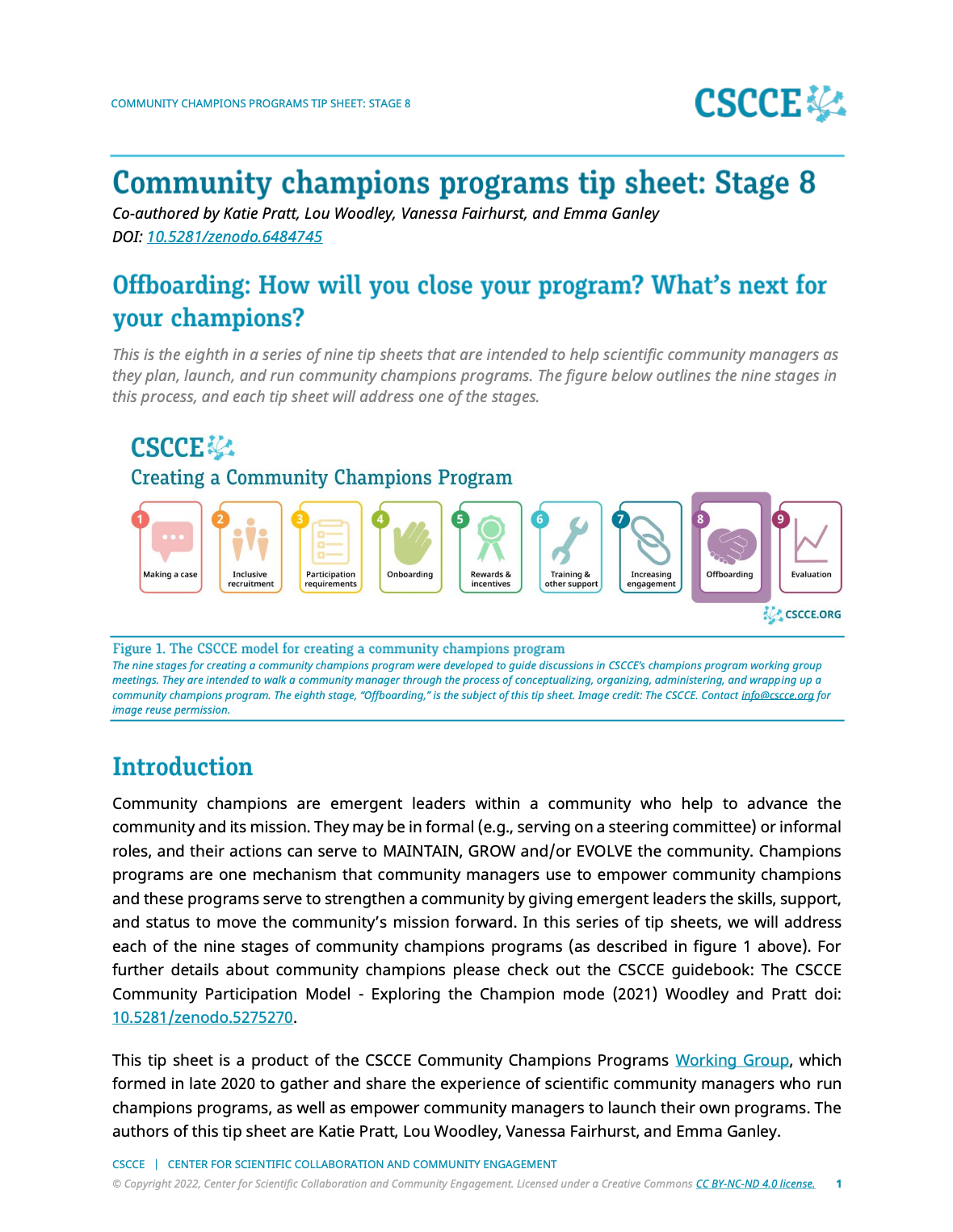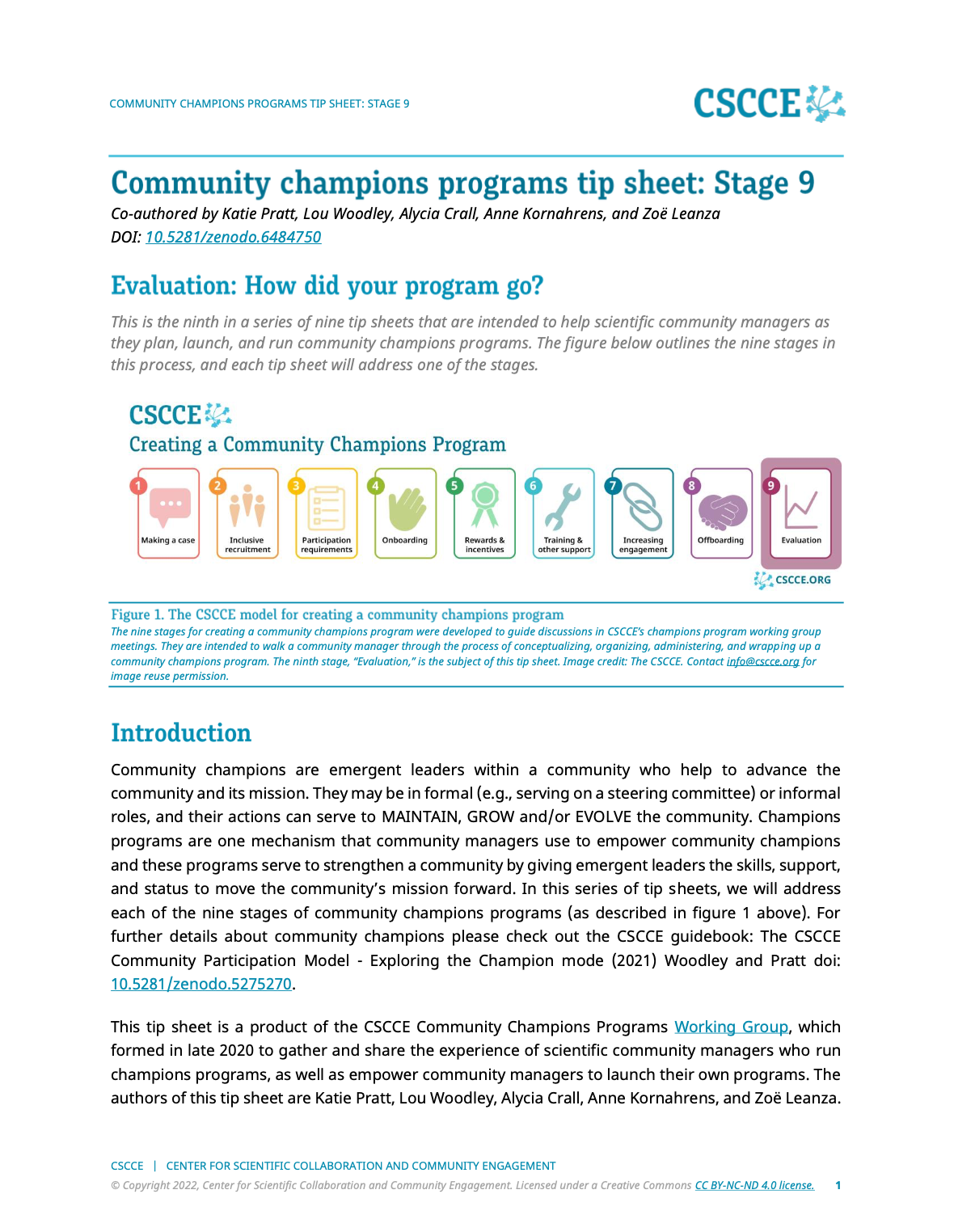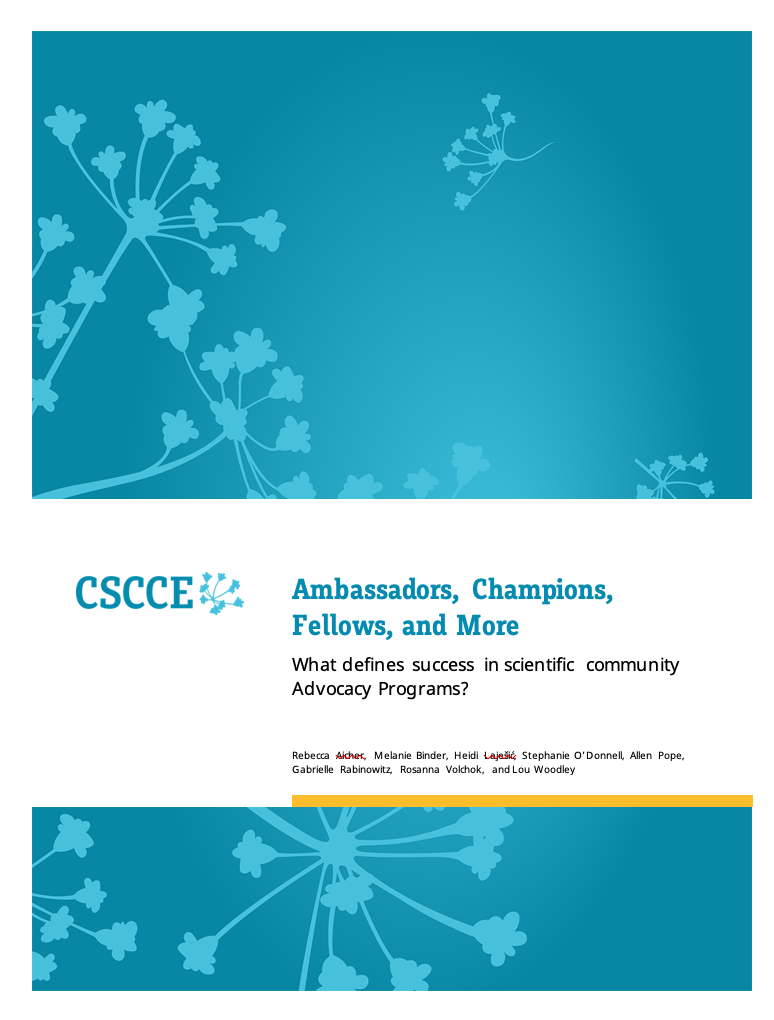Once your community has begun to grow it’s likely that you’re going to need help from community members in running local events, working groups, technical workshops or other “community champion” activities that support the overall success of the community. But where do you start when planning for these activities?
Champions and the CSCCE Community Participation Model
Community champions are emergent leaders – members of a community who wish to take on additional activities in support of the community. To learn more generally about why champions are necessary for community success, check out the CSCCE Community Participation Guide, and its companion guide, which describe the CHAMPION mode in detail.
The CSCCE Community Participation Model: A framework to describe member engagement and information flow in STEM communities
by Lou Woodley and Katie Pratt
The CSCCE Community Participation Model describes four modes of member engagement that can occur within a community and one that can occur outside of it. This guidebook is intended to help you use the model to inform your community member engagement strategy.
The CSCCE Community Participation Model – Exploring the Champion mode
by Lou Woodley and Katie Pratt
In this companion guidebook, part two, we focus in on the CHAMPION mode, in which emerging leaders within a community act in either informal or formal capacity to MAINTAIN, GROW, or EVOLVE the community.
Community champions programs
Community champions programs, in which participants may alternatively be referred to as ambassadors, fellows, or something else, are often the key to successfully empowering and supporting emergent leaders in a community. From 2021-2022, CSCCE convened a working group within our community of practice to explore champions programs, and as a result created a series of nine tip sheets to describe them through a series of stages. You can also find an overview of all nine stages in the champions guidebook linked above.
Community champions programs tip sheet: Stage 1
by Lou Woodley, Katie Pratt, Camille Santistevan, Vanessa Fairhurst, Esther Plomp, and Iratxe Puebla
Making a case: Should you have a community champions program?
Community champions programs tip sheet: Stage 2
by Lou Woodley, Katie Pratt, Camille Santistevan, Anne Kornahrens, Emily Lescak, and Esther Plomp
Inclusive recruitment: How do you find your champions?
Community champions programs tip sheet: Stage 3
by Lou Woodley, Katie Pratt, Camille Santistevan, Vanessa Fairhurst, and Lindsay Starke
Participation requirements: What are your champions expected to do?
Community champions programs tip sheet: Stage 4
by Lou Woodley, Katie Pratt, Camille Santistevan, Emma Ganley, and Lindsay Starke
Onboarding: How will you welcome your champions into the program?
Community champions programs tip sheet: Stage 5
by Katie Pratt, Lou Woodley, Emily Lescak, and Lindsay Starke
Rewards and incentives: What are the tangible benefits to champions for taking part in your program?
Community champions programs tip sheet: Stage 6
by Katie Pratt, Lou Woodley, Alycia Crall, and Elissa Schuett
Training and other support: How will you support your champions?
Community champions programs tip sheet: Stage 7
by Katie Pratt, Lou Woodley, Anne Kornahrens, Zoë Leanza, and Elissa Schuett
Increasing engagement: What do you do if your champions lose interest in the program?
Community champions programs tip sheet: Stage 8
by Katie Pratt, Lou Woodley, Vanessa Fairhurst, and Emma Ganley
Offboarding: How will you close your program? What’s next for your champions?
Community champions programs tip sheet: Stage 9
by Katie Pratt, Lou Woodley, Alycia Crall, Anne Kornahrens, and Zoë Leanza
Evaluation: How did your program go?
In 2017, the Advocacy Ninjas CEFP project team comprised of Stephanie O’Donnell, Heidi Olds, Allen Pope, Gabrielle Rabinowitz and Rosanna Volchok created a survey to better understand what champion programs (at the time, they referred to them as advocacy programs) look like within scientific communities.
They collected data from 37 scientific community managers who work at academic, non-profit, industry, and government sector organizations. They found, among other things: Older programs had the biggest budgets while newer programs offered more incentives for involvement; Program size, community size, and resources may be correlated; And some program characteristics hold similar across various budget sizes, while low budget programs tend to represent smaller communities with fewer internal resources.
For an overview of the project, watch this presentation from co-authors Rosanna Volchok and Allen Pope:
Download the full report:
Ambassadors, Champions, Fellows, and More: What defines success in scientific community Advocacy Programs?
by Rebecca Aicher, Melanie Binder, Heidi Laješić, Stephanie O’Donnell, Allen Pope, Gabrielle Rabinowitz, Rosanna Volchok, and Lou Woodley
This report presents data on the scope, characteristics and efficacy of ambassador programs in STEM, which was collected and analyzed by the CSCCE CEFP "Advocacy Ninjas" Project Team.
What motivates community champions or super-users?
The Busy Bees project team of the CEFP2019 cohort comprised of Toby Hodges, Naomi Penfold and Kathryne Woodle with support from Lou Woodley, created a survey to better understand the motivations of community super-users or ambassadors (which we now refer to as champions). You can learn more about the project from this presentation during the March 2020 community call.
Blog posts
- New publication highlights NMDC Ambassador Program – This blog post, which highlights the success of the NMDC Ambassadors program, describes the outsized impact community champions programs can have in culture change initiatives that rely on a change in community norms.
- 5 guiding questions to help you support community volunteers – CSCCE’s Lou Woodley shares her insights on when and how to support volunteer labor in your community.
- October’s community call recap – Supporting community champions and running champions programs – Our October 2021 community call coincided with the release of our champions guidebook, and included presentations from presentations from Vanessa Fairhurst (Crossref Ambassadors program), Iratxe Puebla (ASAPbio Fellows program), and Ailís O’Carroll (eLife Community Ambassadors program).
- New CSCCE resource explores the role of champions in building and sustaining communities in STEM – an overview of how and why we created a guidebook to supporting community champions.
- Ambassadors, Fellows, Champions, and More: What defines success in scientific community champions programs? – this guest blog post, authored by the Advocacy Ninjas, accompanies the release of their report and lays out their key findings.
- March’s Community Call Recap – What makes a great ambassador program? – a recap of our March 2020 community call, which focused on ambassador (aka champion) programs.
- Changing our Plantae Fellows Program from Exclusive to Inclusive – CEFP2017 fellow Melanie Binder talks about the evolution of a champions program.
- Champions, Ambassadors, Fellows, and More: Introducing the Advocacy Ninjas – CEFP2017 fellow Allen Pope introduces the Advocacy Ninjas and lays out the many names of champion programs.
- Understanding the Advocacy and Ambassador Program Landscape – CEFP2017 fellows Melanie Binder and Rosanna Volchok report out on the early stages of the Advocacy Ninja’s project.
Community champions working group / special interest group
Throughout 2021 and into 2022, CSCCE convened a working group within our community of practice to share knowledge and offer support. We hosted monthly meetings, sometimes including presentations from members, and several members of the working group co-created tip sheets with CSCCE staff (included above). The group has transitioned to become a special interest group, with any member of the CSCCE community of practice welcome to join the Slack channel.
Additional CSCCE resources
The garden metaphor for community management
by Katie Pratt and Lou Woodley
In this concept booklet, we set up the metaphor of a garden for community management, and then, in a series of essays and reflection questions, talk about supporting diversity, inclusion, and accessibility, as well as creating champions programs for your members.
Resources for reuse
CSCCE staff have produced various guidelines and how to guides to support community champions within the CSCCE community of practice. The following resources are licensed CC BY and are available for reuse with attribution.
- Guidelines for working groups and special interest groups
- Guide to setting up your special interest group
- Guidelines for contributing to the CSCCE blog
Consultancy
We offer consultancy for individuals and groups interested in, or already engaged in, running a community champions program (e.g., our work with NMDC, The Carpentries, and rOpenSci). We are also available to offer training in community management to champions cohorts (e.g., our work with eLife). If you are interested in finding out more, please visit our consultancy page, or reach out directly to training@cscce.org.
